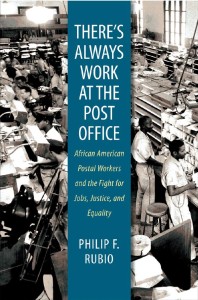 This book brings to life the important but neglected story of African American postal workers and the critical role they played in the U.S. labor and black freedom movements. Historian Philip Rubio, a former postal worker, integrates civil rights, labor, and left movement histories that too often are written as if they happened separately. Centered on New York City and Washington, D.C., the book chronicles a struggle of national significance through its examination of the post office, a workplace with facilities and unions serving every city and town in the United States.
This book brings to life the important but neglected story of African American postal workers and the critical role they played in the U.S. labor and black freedom movements. Historian Philip Rubio, a former postal worker, integrates civil rights, labor, and left movement histories that too often are written as if they happened separately. Centered on New York City and Washington, D.C., the book chronicles a struggle of national significance through its examination of the post office, a workplace with facilities and unions serving every city and town in the United States.
Black postal workers–often college-educated military veterans–fought their way into postal positions and unions and became a critical force for social change. They combined black labor protest and civic traditions to construct a civil rights unionism at the post office. They were a major
factor in the 1970 nationwide postal wildcat strike, which resulted in full collective bargaining rights for the major postal unions under the newly established U.S. Postal Service in 1971. In making the fight for equality primary, African American postal workers were influential in shaping today’s post office and postal unions.
About the Author
UNC Press
472 pp., 6.125 x 9.25, 46 illus., notes, bibl., index
ISBN 978-0-8078-3342-1
ISBN 978-0-8078-5986-5
Reviews
“Singlehandedly rescue[s] an important part of African American history. . . . A substantial achievement.”
–Greensboro News & Record “Page Turners” blog
“A major contribution. . . . While There’s Always Work at the Post Office
rests on the extensive and careful archival work that earned Rubio a
Ph.D. at Duke University, it also incorporates the stories and voices of
black workers that an activist history must include.”
—XCP: Cross Cultural Poetics
“[An] impressive study. . . . This excellent book documents
what postal work meant for many Americans. . . . Highly recommended.”
—Choice
“A vitally important study–full of memorable characters,
patient struggles, dramatic turns, historiographical insights, and
meticulous research. In giving us the exciting story of African American
postal workers, Rubio recasts the whole story of postal unionism and
indeed of postal work.”
–David Roediger, author of How Race Survived U.S. History
“Drawing on his experiences as a postal worker and on his
talents as an historian, Philip F. Rubio establishes the significance of
employment in the U.S. Postal Service to African American communities.
In great detail he also brings to light the important role of postal
workers–female and male–as “movers and shakers” in the struggle for
civil rights and economic justice. Based on thorough research, written
in clear jargon-free prose, and effectively illustrated, this is a
wonderful book. Well done, Brother Rubio.”
–John H. Bracey, University of Massachusetts, Amherst,
editor of the Papers of the NAACP and the Records of the Brotherhood of
Sleeping Car Porters



